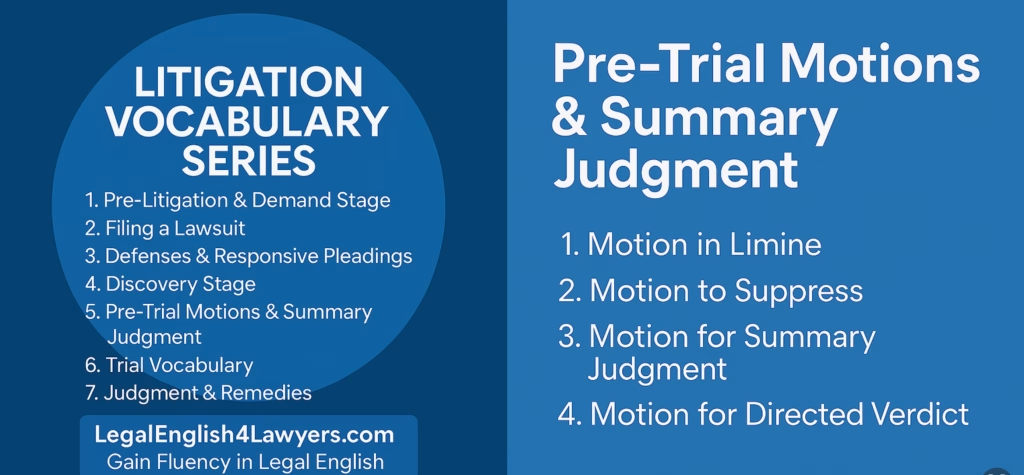
Introduction To Pre-Trial Motions and Summary Judgment.
As litigation approaches trial, pre-trial motions become a central strategic tool. This phase is about shaping what the judge or jury will hear, what evidence will be admitted, and even whether a trial is necessary at all. For attorneys—especially those working internationally or in a second language—fluency in Legal English for Pre-Trial Motions is essential. This fifth installment in our 8-part Litigation Vocabulary Series focuses on the most important vocabulary lawyers need to communicate with confidence and clarity during this critical stage.
Pre-Trail Motions and Summary Judgement Vocabulary
1. Motion in Limine
Definition:
A pre-trial request to exclude certain evidence from being introduced during the trial.
Example:
Plaintiff filed a motion in limine to prevent the defendant from referencing the plaintiff’s prior lawsuits.
Legal Context:
This motion allows lawyers to argue that certain evidence is inadmissible—because it is irrelevant, prejudicial, or misleading—before it’s ever presented to the jury. The judge decides whether the evidence should be excluded or admitted conditionally.
- Inadmissible evidence: Information that cannot be presented in court due to legal rules.
- Prejudicial: Likely to unfairly influence the jury’s decision.
2. Summary Judgment
Definition:
A request asking the court to decide a case or specific claims without a trial, on the basis that there are no disputed material facts.
Example:
Defendant moved for summary judgment, arguing that the facts were undisputed and the law clearly supported dismissal.
Legal Context:
Summary judgment allows the court to resolve legal disputes without the cost and delay of trial. It is often filed after discovery and relies heavily on affidavits, declarations, and deposition transcripts to demonstrate that no factual disputes remain.
- Affidavit: A written statement of facts confirmed by oath or affirmation.
- Deposition transcript: A written record of sworn out-of-court testimony.
3. Pre-Trial Conference
Definition:
A court-ordered meeting between the parties (and sometimes the judge) to discuss trial readiness and streamline issues before trial.
Example:
At the pre-trial conference, both parties agreed to limit expert testimony to four witnesses.
Legal Context:
These conferences promote efficiency by finalizing the list of witnesses, exhibits, and unresolved issues. The court may issue a pre-trial order, which governs the conduct of trial and can limit the introduction of previously undisclosed material.
- Pre-trial order: A formal document issued by the court outlining agreed procedures, issues, and evidence.
4. Judicial Notice
Definition:
A court’s acceptance of a fact as true without requiring formal evidence.
Example:
The judge took judicial notice of the fact that January 1 is a federal holiday.
Legal Context:
This doctrine allows courts to recognize common facts that are not reasonably disputed, such as public laws or dates. Judicial notice can be used strategically to bypass unnecessary proof for obvious or well-known facts.
- Doctrine: A legal principle developed through precedent or statutory authority.
5. Stipulation
Definition:
An agreement between opposing parties on a particular fact or legal issue.
Example:
The parties entered a stipulation that the contract was signed on March 12.
Legal Context:
Stipulations streamline litigation by reducing the number of facts that need to be proven at trial. They are binding and can simplify motions, pre-trial planning, and jury instructions.
- Binding: Legally enforceable and not subject to dispute unless withdrawn by both parties.
6. Daubert Challenge
Definition:
A motion to exclude expert witness testimony that does not meet standards of relevance and reliability.
Example:
The defense filed a Daubert challenge to prevent the plaintiff’s expert from testifying on economic damages.
Legal Context:
Originating from U.S. Supreme Court case Daubert v. Merrell Dow Pharmaceuticals, this motion tests whether an expert’s methods are scientifically valid and applicable to the case. Judges act as gatekeepers to ensure only qualified expert testimony reaches the jury.
- Expert witness: A person qualified by knowledge, skill, experience, or education to offer opinions in court.
- Gatekeeper role: The judge’s responsibility to ensure that expert evidence meets minimum reliability standards.
7. Motion to Exclude
Definition:
A request to prevent specific evidence or testimony from being introduced at trial.
Example:
Plaintiff filed a motion to exclude surveillance footage that had not been disclosed during discovery.
Legal Context:
This motion is typically based on violations of discovery obligations or rules of evidence. It ensures fairness by discouraging trial by surprise, where previously undisclosed material is used at the last moment.
- Trial by surprise: The use of unexpected or undisclosed evidence that disadvantages the opposing party.
8. Motion to Strike
Definition:
A request to remove improper or irrelevant parts of a pleading from the court record.
Example:
Defendant filed a motion to strike inflammatory language from the complaint’s introductory paragraph.
Legal Context:
This motion cleans up the legal record and ensures the jury is not exposed to legally inappropriate statements. It may also apply to evidence presented at trial, such as testimony that violates prior rulings.
- Pleading: A formal written statement of a party’s claims or defenses.
More information on motions to strike.
Conclusion: Pre-Trial Motions & Summary Judgement
Pre-trial motions are where legal arguments crystallize, and cases are often won or lost before they reach a jury. Fluency in the terminology of this stage is not just about vocabulary—it’s about understanding the legal strategy and communicating with authority. Whether negotiating stipulations, drafting a motion in limine, or preparing for summary judgment, Legal English proficiency at this phase is essential.
Build Your Legal English Skills with Confidence
Clear, confident communication is essential for every lawyer. Whether you’re working on conversations, meetings, or documents, strong Legal English helps you succeed. Book a free coaching session and start building skills you can use in any area of legal practice.
Disclaimer
DISCLAIMER: The content provided herein is only for discussion purposes and may contain errors. The reader is responsible to confirm the accuracy of the information provided. The content does not constitute legal or professional advice. We disclaim any liability for any loss or damage incurred directly or indirectly from the use of this information.

